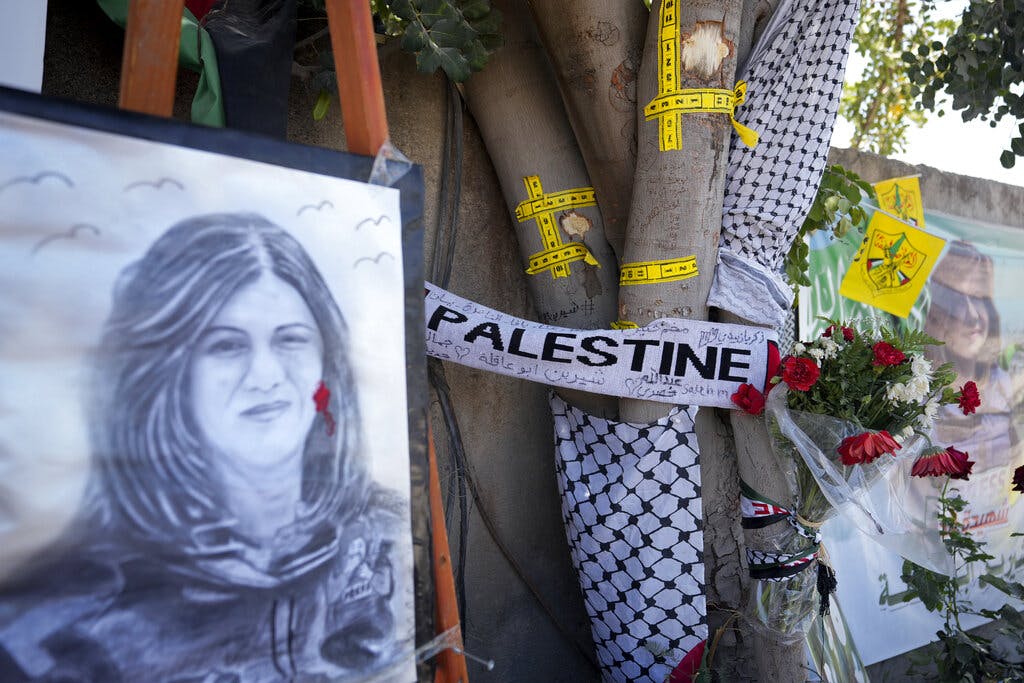On 50th Anniversary of Munich Massacre, IDF Issues Report on Death of Shireen Abu Akleh
A hedge on the possible cause of death, as well as the Israeli army’s decision not to accuse its soldiers of committing a crime, will further convince the predisposed to believe the worst of Israel.

In a peculiar coincidence, today’s Israeli Defense Forces report on the death of a Palestinian-American reporter, Shireen Abu Akleh, was issued on the 50th anniversary of a seminal event in the history of global terrorism: the 1972 Munich massacre.
According to the long-awaited report, “there is a high possibility that Shireen was accidentally hit by IDF gunfire that was fired toward suspects identified as armed Palestinian gunmen, during an exchange of fire in which life-risking, widespread and indiscriminate shots were fired toward IDF soldiers.”
Then again, the report goes on to say, “another possibility remains that Abu Akleh was hit by bullets fired by Palestinian militants.” The hedge, as well as the Israeli army’s decision not to accuse its soldiers of committing a crime, will further convince the predisposed to believe the worst of Israel.
“What a ridiculous claim,” a widely followed Washington-based Bloomberg columnist, Hussein Ibish, tweeted. “A stray bullet from occupation soldiers quite far away just so happened to hit by far their most hated, despised and loathed journalist in the face. Because, you know, these things happen. They’re insulting your intelligence, very badly.”
A reporter for Al Jazeera, Abu Akleh is now described at Washington as a “courageous” and “even handed” journalist, even while Israelis and the IDF had reasons to consider coverage one-sided in favor of their enemies. Still, the idea that her journalism earned her a death sentence in the most press-friendly country in the region is preposterous.
The IDF conclusions, in fact, were the most likely scenario right from the start. The gunfight at a Palestinian camp near Jenin on the morning of May 11 was fierce. Armed Palestinians were shooting indiscriminately. As an elite IDF unit returned fire, Abu Akleh was caught in the crossfire near the end of the fire exchange.
“At no point was Shireen identified and at no point was there any intentional gunfire carried out by IDF soldiers in a manner intended to harm the journalist,” the army chief of staff, Lieutenant General Amir Kohavi, said today, describing the report that beyond forensic findings relied on extensive interviews with the IDF troops.
The battle followed a spate of killings in Israeli towns. It was at the the onset of a new wave of terrorism that has instensified since, and is ongoing. The May 11 battle launched a protracted anti-terror operation that the IDF calls a “wave breaker.”
Israel has been targeted for terrorism from the time that Zionists dreamed up the idea of creating a sovereign state for the Jews in their ancestral land. In the 1960s an Arab organization calling for the “liberation” of Palestine was the world’s most prolific innovator in creating new forms of terrorism.
The Soviet-backed PLO, headed by Yasser Arafat, believed that by committing high-profile acts of violence, the world would notice the plight of the Palestinian Arabs. Its tactics were admired and emulated by Maoists in Latin America, the “Red Army” in Japan, the Baader-Meinhof group in Germany, and the likes.
While plane hijackings and the slaughter of civilians became commonplace, the worst was yet to come: As the world was watching the onset of the 1972 Olympics on September 5, a group affiliated with the PLO massacred 11 Israeli athletes on live television.
The hapless German authorities tried to negotiate with the terrorists, and then led a botched rescue attempt. It took decades for the German government to acknowledge its failures, apologize, and pay compensations to the victims’ families.
Today, a German news outlet, RBB24, was forced to delete a tweet and apologize for writing that “17 people died in the assassination attempt on the Israeli team at the 1972 Olympics in #München.” The outlet bundled the six terrorists who died in the operation with the 11 Israeli athletes.
Shireen Abu Akleh was no terrorist. She was a television reporter who got wind of the coming Israeli operation and rushed to the scene. Wars are a messy human affair, and the brave souls who cover them put their lives on the line. Yet, deaths of high-profile reporters in places like Ukraine, including Americans, do not receive nearly as much ink as her May 11 death near Jenin.
Unlike Germany, Israel’s war against terrorists has become the stuff of legend. Steven Spielberg’s “Munich” caricatured it as a futile bloodletting between peoples with competing “narratives.” The fallout from today’s IDF report will likely be just as inanity-ridden as that film.
The big picture will be lost. Yesterday, the Israeli defense minister, Benny Gantz, nominated Major General Hertzi Halevi to replace General Kohavi as IDF chief of staff. As with his predecessor, the war on Palestinian terrorism will now be part of his portfolio. Preventing deaths of the innocent, including war correspondents, is becoming an important part of that war.
At the top of the general’s agenda, though, is maintaining the IDF’s record of doing the exact opposite of what the German security forces did in 1972: fight terrorists as efficiently as possible, and let the chips fall where they may.

